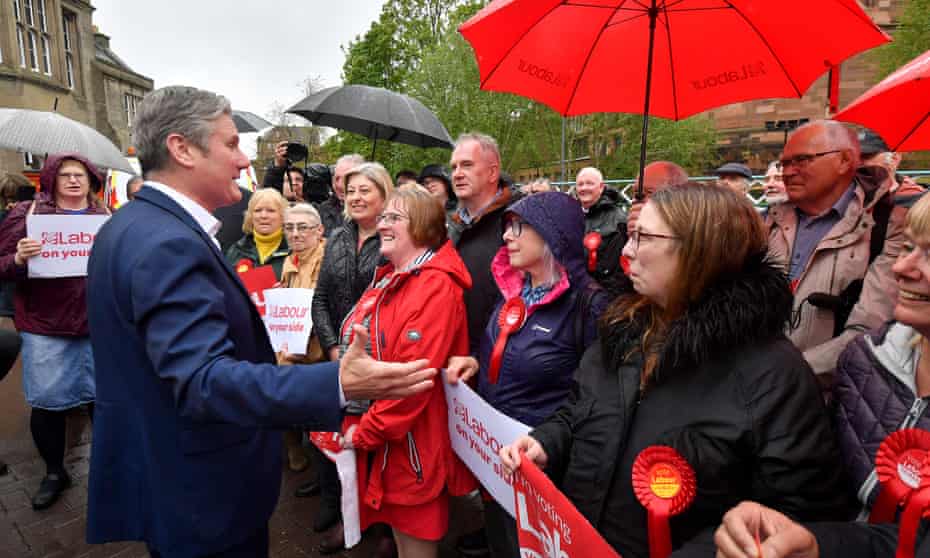Analysis: it was certainly not a good night for the Conservatives but neither was it a clear-cut victory for the Labour party
Robert Ford Guardian
Sat 7 May 2022 16.31 BST

The Conservatives lost but Labour didn’t win. In a messy night with multiple cross-currents, voters turned against the Tories in many areas, yet an uneven Labour performance failed to fully dispel doubts about its appeal to the electorate.
Tory nerves will be jangling after a heartland slump and the loss of prized London councils, but Labour strategists will also be anxious about mediocre performances in the leave-leaning battlegrounds of England.
It was the Liberal Democrats who had the happiest night on Thursday, posting hundreds of gains up and down the country, while the Greens made major gains as voters sought alternatives to an unpopular government and an unconvincing opposition. A heartland slump and hundreds of seat losses will put new pressure on the prime minister, but his opponent, Keir Starmer, may also face criticism after failing to deliver a knockout.
This was on any measure a bad night for the Conservatives, who won 30% on the BBC’s projected national share (PNS) calculation, which adjusts for variations in the areas up for election in each local election cycle. This was down four points on 2018, when the seats up this week were last contested, and six points on 2021. The Tory poll slump has been matched at the ballot box, with nearly 350 English council seats lost, almost a quarter of the party’s starting total.
Labour’s projected 35% was up four points on last year, and gave the opposition the largest lead over the government since 2012. There was plenty for the party to cheer about, as the opposition gained seats and took control of councils across all three British nations. But Labour’s overall vote share was no better than four years ago, and the party’s progress was uneven.
Advance in Scotland and Wales was easier as seats in both countries were last up in 2017, giving Labour a lower starting point. Labour made some dramatic breakthroughs in London and an overall gain in the south of England, but its vote share stagnated in the Midlands and fell back in the north, suffering overall net seat losses across both crucial battleground regions.
The Liberal Democrats won a huge haul of more than 200 net seat gains, beating all expectations as disgruntled voters in Tory heartlands swung to the party across England, with gains in Scotland and Wales too. The Greens were also smiling after a third strong showing in a row in local elections, up by an average of four points on 2018 in seats they contested both times, with concentrated surges helping them to capture more than 60 English seats, often on huge swings.
While the local results will be sifted for portents of progress or decline in the next general election, the election with the most immediate political consequences was in Northern Ireland, where Sinn Féin made political history by becoming the first nationalist party ever to top the poll in the province. Yet this, too, was a messy result defying simple interpretation.
Sinn Féin did not win new support, it simply held its vote together while the unionist vote disintegrated, with a large swing away from the DUP to the anti-Northern Ireland protocol TUV.
And in an election with potentially seismic consequences for the balance of power between unionists and nationalists, the biggest gains were made by the Alliance, a party that rejects sectarian politics altogether. Change is in the air in Northern Ireland, though what form that change will take remains unclear.

London grabbed the early headlines on Friday, as the Conservatives suffered a meltdown in the capital, with a dismal result exceeding the most pessimistic pre-election predictions, losing three high-profile councils with only the unexpected gain of Harrow to brighten an otherwise dark night.
Labour had not run any of Barnet, Wandsworth or Westminster for nearly 50 years. Now they control all three. The red tide has been rising in the capital for many years, and with Labour now in control of Margaret Thatcher’s favourite council and the seat of government itself, the capital is close to becoming a one-party state. Yet while this was a worst-case scenario for the Conservatives, the underlying trends driving their decline are not new.
All the pro-Labour currents in today’s politics converge in London, which is younger, more ethnically diverse, more graduate heavy and more on the remain side than the nation as a whole.
While a Conservative decline in London was expected, a collapse for the government in its heartlands was not. The Tories are now suffering a major bout of southern discomfort – the fall in Tory support was much larger in the south than the north or Midlands, and largest of all in the southern bastions where they performed best in 2018.
Tory decline in the Home Counties, already evident in the 2019 general election, has intensified. Southern Tory MPs will be getting nervous, as double-digit swings to the Lib Dems suggest even those with large majorities may not be safe from a revolt of disgruntled middle-class professionals. The anxiety will intensify if the forthcoming Tiverton byelection brings defeat in another heartland seat that has hitherto returned Tory MPs for a century.
After five years as the punchbag of coalition, and four as the tribunes of remain, the Lib Dems are recovering their traditional role as the catch-all party of protest. The third party bested the Conservatives up and down the country, from David Cameron’s West Oxfordshire to Tim Farron’s Westmorland and Furness. Lib Dem activists will be particularly heartened by a strong recovery in Somerset, a leave-leaning former heartland area where their vote had been decimated by coalition and Brexit. The party will hope Thursday’s sweeping gains, which delivered control of the newly created council, will be a harbinger of recovery in its erstwhile heartlands of the south-west.
This was another strong election cycle for the Greens, whose advance in local elections is posing new questions for all of the parties. The Greens now provide a new challenger for Labour in many urban strongholds and for the Conservatives in remain-leaning bits of their heartlands.
The Liberal Democrats face competition for protest votes in graduate-heavy places, while in Scotland the Greens are challenging the SNP for pro-independence voters.
Three big seat hauls in a row mean the Greens are now an established presence on councils across Britain, though it remains to be seen whether they can use a growing local presence as a springboard to credible general election campaigns.
Beneath the headlines is a complicated set of results that defy simple interpretation. The opposition have bounced back strongly on their 2021 lows, and done best in the most pro-leave areas of England. A messy result will do little to resolve internal party debates, as each side will pick the data to suit their story. For example, supporters of Keir Starmer will point to big swings since last year as evidence that Labour is recovering from a historic collapse in 2019. His critics will say stagnant support and seat losses show that Starmer’s approach is not delivering results, even against a floundering government in crisis. Both sides have a point. Labour are recovering but have a lot of work still to do.
Neither will these results provide resolution to the Conservative debate over Boris Johnson’s leadership. Hundreds of seat losses and a heartland collapse will hand potent ammunition to his opponents, yet loyalists will point to a relatively strong showing in the English battlegrounds as evidence that this hold on leave voters’ affections remains intact.
Keeping Johnson could add fuel to a southern heartlands revolt, but replacing him with a central-casting Conservative could trigger a red wall backlash. The prime minister’s fate may turn on which of these risks worries his MPs most.
Robert Ford is professor of political science, University of Manchester, and author of The British General Election of 2019
Source:
https://www.theguardian.com/politics/2022/may/07/uk-local-election-results-were-messy-now-boris-johnsons-future-is-on-the-line